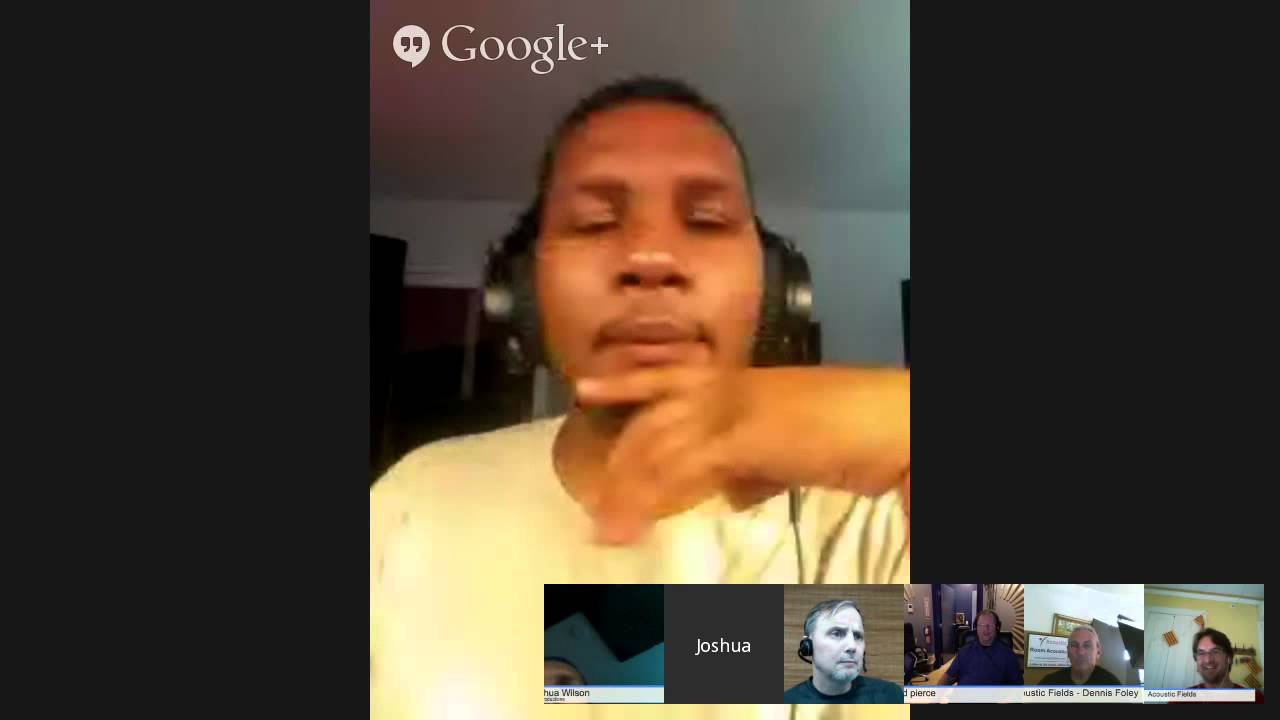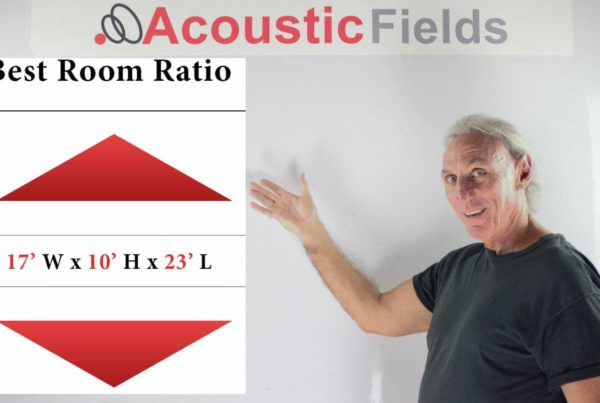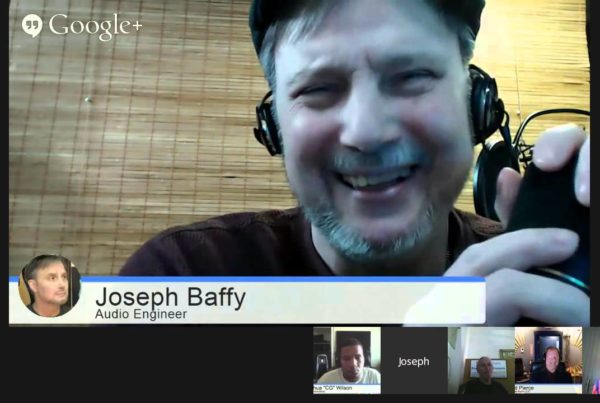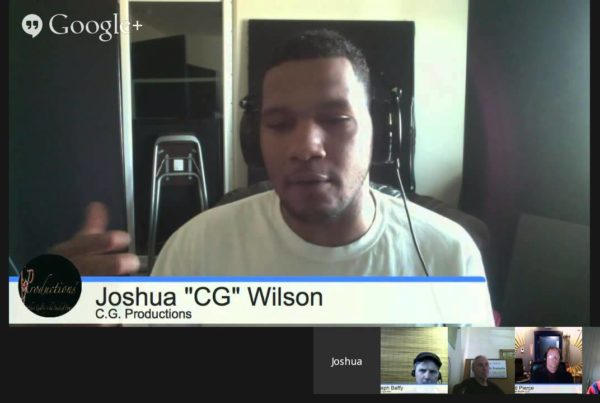In a recent Google Hangout I got together a bunch of experienced and talented audio engineers to help bridge the gap between what you are hearing as an engineer and how the room is causing that problem. We tried to cut through some of the confusion between “mix sound” and “room sound”. The following video and transcript comes from one particular section where we addressed the issue “Why Mixing In a Bad Room Can Slow Your Engineering Skill Development”. If you would like to see the full hour and a half discussion you can see the video further down the page.
Dennis Foley (DF): Well let’s try this. Brad tell me, you mentioned that you record and then you playback and then you do some workarounds. Could you give us an example? Maybe use an instrument that you’ve recorded in your studio and then when you played it back in an area. Let’s try to help people by maybe using instruments that we’re all familiar with.
Joseph Baffy (BF): That’s a great idea, right.
DF: And see if we can figure out the workaround that you have to go through. Joshua says he records and then he goes in to his car. Brad, tell me a little bit about your procedure.
Brad Pierce (BP): Alright well it would be a little easier if I could maybe say voice, talk about voice in a mix maybe like a rock kind of song. You know that with the voice you know 150 to 300 is can be a tricky area. Too much is kind of be boxy and morphed-in and too little will be you know pretty thin, make it brittle and thinly unless you were going for that. But say you were going for a natural sound, when I take the mix out of this room and I tested in different places like in my living room which is pretty bad acoustically, the car which is may be a lower, mid to lower quality maybe a boom box that type of thing, you really, that area, that frequency area is just striking to me it’s like a tell all, it’s like sometimes I think ‘What was I hearing?
How come I didn’t hear it like that in the room I mixed in?’ so you know you come back and you make adjustments and then through doing that enough, you get to know that maybe what’s happening in the room is interfering with my perception of reality. So that’s pretty much the procedure, you know I’ve done it enough now that I can tell pretty much right away sitting in the mix room whether or not I’m going to have issues outside and you do get good at it but if didn’t have to do that it would make my job so much easier because I would be listening to the truth in the room and then when I took it out into reality I wouldn’t have those issues, it would be gone because my perception in the room while I was working on it would be the truth so that would help a great deal, that’s what I think.
DF: Joshua how about you? You mentioned the low-end. Tell us a little bit about your experience with translation in the low-end.
Joshua Wilson (JW): Well like I said like a lot of time it’s been a bit bassy but there’s a few things that I’ve been that I’ve started to do the not normally done and that’s mixing in mono and I feel like that actually helped me a lot a great deal with placement.
I started mixing and mixing in mono and I feel like my mixes are coming out a lot better by bringing it to mono in this room and I mean in general like from what I’m hearing in general just like starting to mix in mono is probably a great way to get a great mix, a great start to getting a great mix and then switching to stereo and obviously doing your you know whatever you have to do in stereo. But I think that’s kind of like narrow things down to where like because a lot of you know what we’re hearing is just a lot of the build-up and phasing and stuff like that.
If you got one channel, if you got one single going out I feel like it’s harder to get phasing and build-up than when you have two signals going out and crashing with each other that you know I mean. So that’s just something else I’ve been doing and like I said and then just you know I actually haven’t been going back and forth I have been just mixing and then how it comes out is the way, you know that’s it, you know what I mean. But obviously there’s things in this room that could be better to get me an even better mix you know I mean so I feel like I can only get, there’s a certain point that I can get to in detail in this room with what I have in it now. You know I mean and I can get pretty good but still like I said feel like I said when I brought my mixes to Dennis’ studio there was a lot of things that I didn’t like in the mix that I heard you know.
AD: It seems to me a little bit like you, I’m trying to think of the analogy to put it. So it’s almost like you know everybody’s sort of having, everybody’s perception of reality like Brad was saying is slightly different because of the room and you try to compensate and you try to think of what the reality is and you don’t know what it is until you kind of have tested it in enough places. Is that kind of the correct way to interpret it? It’s almost like Dennis’ room kind of a sober experience and your mix is a little bit cloudy.
JW: Yeah, yeah and the thing is you work with what happen to you, you may not get used to the room you know. If you mix in a room for so long that you end up adjusting to the room and you end up being over the kind of pick things up you know a little bit better but like the thing is as engineers have a growth so eventually you’re going to outgrow you know that like “Okay I don’t want to adjust for this anymore I want better”, that’s why we end up you know changing things and what will happen it’ll be, it’ll be years and then all of the sudden like you know like “I hate this let me, I want to change this now”, you know I mean. So and then the thing is the reason why so long because we get in that comfort zone and it’s like “Okay it’s been my, I can work around this doing this right here” but it gets to the point to we’re like you know maybe one day you come in you know I’m tired of working around that I want to make it to where I don’t work around, I don’t want to think about that anymore. You know it may come from like just the workload of running back and forth to the car to be right straight out of my studio, you know I mean so.
BP: A lot more efficient. You work a lot more efficient when you don’t have, you’re spending all the energy compensating so that you’re not really getting worked on. If you could start a couple of rooms up without having to compensate then you would achieve know a higher level of quality of product I think.







